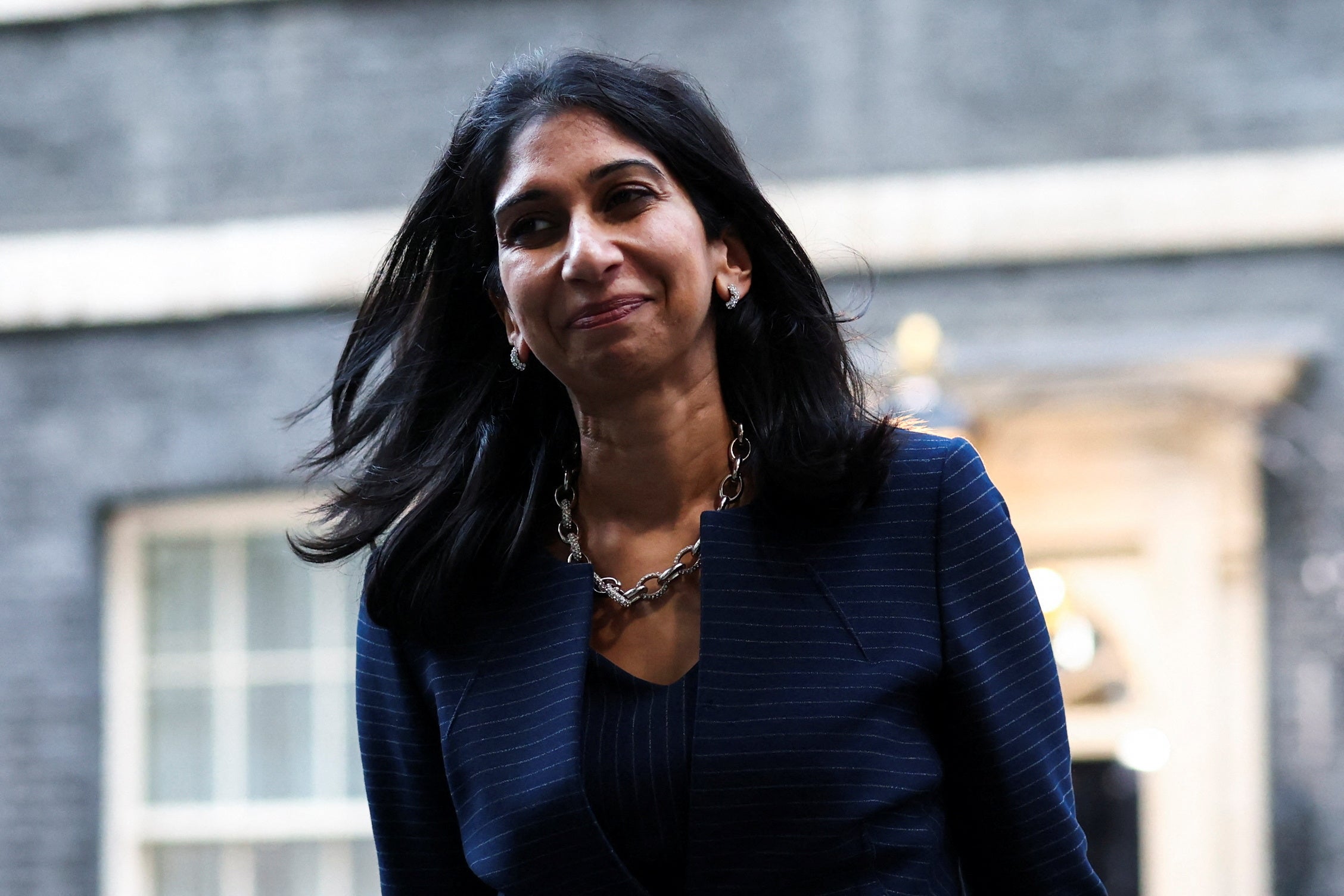The return of Suella Braverman is Rishi Sunak’s first mistake
It looks as if he put the politics of a secret deal for the support of a tiny block of ideological MPs above the needs of the country, writes John Rentoul


Bringing back the bane of the tofu-eating wokerati, Suella Braverman, as home secretary looks like a high price for Rishi Sunak to have paid in the negotiations behind closed doors that decided the Conservative leadership contest.
Braverman’s support for Sunak – along with the support of her fellow European Research Group leader, Steve Baker – helped to force Boris Johnson out of the contest, but it looks as if it was bought by the promise of a return to the Home Office.
This can mean nothing but trouble for what was supposed to be a return to low-temperature politics, the return of pragmatism after a flirtation with a dogmatic belief system. Braverman was a thorn in the side of her fellow right-winger Liz Truss; imagine how helpful she is going to be to a centrist such as Sunak.
Not that these labels are particularly useful. There are different strands of right-wing thought in the Tory party: Truss was an economic liberal who was sidetracked into “tax cuts at all costs”, while Braverman is an anti-immigration nationalist. She was sacked just six days ago on the pretext of sending an email to the wrong person, but actually because she and Truss had “the mother of all rows” about immigration policy the day before.
That row will now continue, with Sunak. The new prime minister is also more of an economic liberal than he is an anti-immigration nationalist; what is more, he is a market pragmatist who has a single priority in his first few days, which is to make the numbers add up so that the Office for Budget Responsibility (OBR) can sign off the chancellor’s statement on Monday. (Unless it is postponed to allow Sunak more time to think about it, which is a possibility that the markets would probably be relaxed about, given that he is now in charge.)
And the substance of the row between Truss and Braverman was that Truss wanted the OBR to be allowed to assume that immigration would remain at current levels, which would boost the economy, while Braverman wanted it to be told to assume declining levels of immigration, in line with the 2019 manifesto promise. That argument will now resume, at the highest level of government.
Braverman has also shown that she isn’t a team player, by advertising her personal view that Britain should leave the European Convention on Human Rights, which is not government policy. As home secretary, she was bound by collective responsibility to promote the agreed policy. Just because Truss’s government was collapsing around her ears did not give her licence to do what Trotskyists do when they want to disagree with the views of their sect, which is to add “writing in a personal capacity” to the end of their articles.
Sunak had made a good start today. After his first wobbly words in public for weeks yesterday, to an off-centre autocue in Conservative HQ, he found his voice with a strong speech in Downing Street. It was theatrical and formulaic, but it was the kind of speech you would expect a competent prime minister to make. His cabinet-making started slowly and in an orderly fashion. His early personnel decisions were the kind you would expect from someone who knows what they are doing.
He kept Jeremy Hunt as chancellor; restored Dominic Raab as deputy prime minister and justice secretary; punished Penny Mordaunt for refusing to do a deal with him by keeping her where she was. Beyond that, Simon Hart seems a good unity-minded choice as chief whip. Ben Wallace, the defence secretary, is popular with party members and will accept sensible settlements instead of Truss’s spending spree.
To keep up to speed with all the latest opinions and comment, sign up to our free weekly Voices Dispatches newsletter by clicking here
I am not convinced that James Cleverly is the foreign secretary who can solve the Northern Ireland problem, on which the Foreign Office is currently the lead department, but he should be given a chance.
The reshuffle looked a little dull until 4.59pm, when Braverman’s appointment was announced. Some of us were looking forward to a period of relative calm and relative competence. Sunak can do little about the resentments that swirl in a party that has been in government for too long, when there are always more office-seekers than offices to be sought, but he seemed to be managing them.
There had been speculation that he would want his own person – namely his close friend and ally Oliver Dowden – as chancellor, but it would have unsettled the markets to have changed the second lord of the Treasury again. Even though Sunak himself is reassuring balm to the markets, it would have seemed unnecessary.
But it will be Braverman’s appointment that will define this cabinet. He said in his speech in Downing Street: “I stand here before you ready to lead our country into the future; to put your needs above politics.” Instead, it looks as if he put the politics of a secret deal for the support of a tiny block of ideological MPs above the needs of the country.






Join our commenting forum
Join thought-provoking conversations, follow other Independent readers and see their replies
Comments